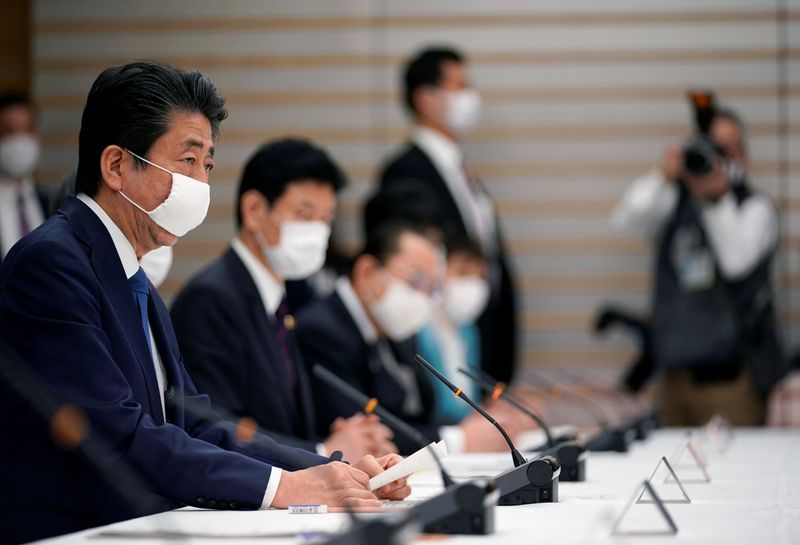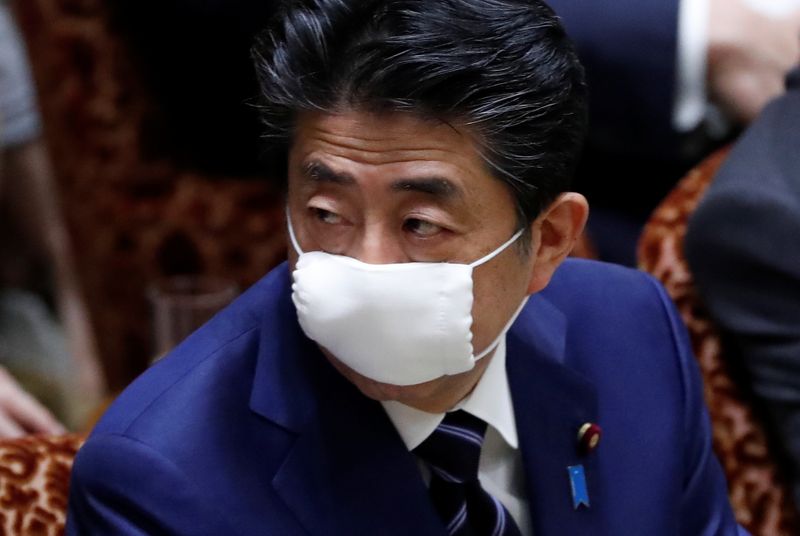By Linda Sieg and Chang-Ran Kim
TOKYO (Reuters) - Japan is to impose a state of emergency in Tokyo and six other prefectures as early as Tuesday to try to stop the coronavirus, the prime minister said, with the government preparing a $990 billion stimulus package to soften the economic blow.
More than 3,500 people have tested positive for the coronavirus in Japan and 85 have died - not a huge outbreak compared with some hot spots. But the numbers keep rising with particular alarm over the spread in Tokyo, which has more than 1,000 cases, including 83 new ones on Monday.
"Given the state of crisis on the medical front, the government was advised to prepare to declare the state of emergency," Prime Minister Shinzo Abe told reporters.
An emergency, which Abe said would last about a month, will give governors authority to call on people to stay at home and businesses to close, but will not be as restrictive as lockdowns in some other countries.
In most cases, there will be no penalties for ignoring requests to stay at home, and enforcement will rely more on peer pressure and respect for authority.
Pressure had been mounting on the government to take the step although Abe had voiced concern about being too hasty, given the restrictions on movement and businesses it would entail.
Abe also said the government has decided to launch a stimulus package of about 108 trillion yen, including more than 6 trillion yen for cash payouts to households and small businesses and 26 trillion yen to allow deferred social security and tax payments.
It was not immediately clear how much of that package would be new government spending.
"The government wants to help businesses continue and protect jobs," Abe said.
An emergency appears to have public support. In a poll published on Monday by JNN, run by broadcaster TBS, 80% of those surveyed said Abe should declare it while 12% said it was not necessary. His approval rating fell by 5.7 points from last month to 43.2%, the survey showed.
But Kenji Shibuya, director of the Institute for Public Health at King's College, London, said the emergency was too late given the explosive increase in cases in Tokyo.
"It should have been declared by April 1 at the latest," he said.
GRAPHIC: Coronavirus: Knowns and unknowns - https://graphics.reuters.com/HEALTH-CORONAVIRUS-UNKNOWNS/0100B5M447T/index.html
CALL FOR CALM
Sounding an alarm over the high rate of cases that could not be traced, Tokyo Governor Yuriko Koike indicated last week that she would favour a state of emergency as a way to help her urge residents to abide by stronger social-distancing measures.
An expert on the government's coronavirus panel said Japan could avoid an explosive rise by reducing person-to-person contact by 80%.
Under a law revised in March to cover the coronavirus, the prime minister can declare a state of emergency if the disease poses a "grave danger" to lives and if its rapid spread could have a big impact on the economy.
Economy Minister Yasutoshi Nishimura called for calm saying there was no need for people in designated prefectures to flee to other regions, which could spread infections, NHK reported.
While Japan's coronavirus epidemic is dwarfed by the 335,000 infections and more than 9,500 deaths in the United States alone, experts worry a sudden surge could overwhelm Japan's medical system.
Abe must seek formal advice from a panel of experts before deciding to go ahead and declare the emergency.
Governors in Tokyo and elsewhere have asked citizens to stay home on weekends, avoid crowds and evening outings, and work from home. That has had some effect, but not as much as many experts said was needed.

($1 = 109.2200 yen)
